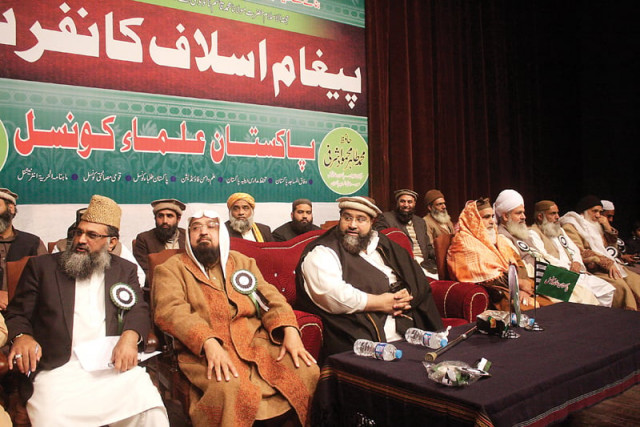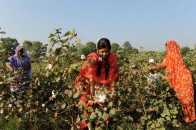Ways forward: Ulema express solidarity with Peshawar attack victims
Participants adopt several resolutions at a conference on Tuesday.

Speakers at PUC’s conference condemned the December 16 terrorist attack on the Army Public School in Peshawar and demanded an honorary Nishan-i-Haider award for the school’s principal and students.
“Today’s conference expresses solidarity with the families of the victims of the Peshawar attack and demands that the government arrest the culprits and expose their backers,” the resolution said.

They passed another resolution demanding that the government revisit its domestic and foreign policies considering regional and global circumstances. “We should not interfere in the affairs of any country nor should we allow any country to interfere Pakistan’s affairs.” The resolution demanded that all kinds of armed groups and organisations be banned.
The speakers said non-Muslims in Pakistan must be granted equal rights. They said the government was responsible for protecting the lives, property, honour, dignity and worship places of non-Muslims in the country.
Another resolution passed at the conference said that the PUC condemned a campaign maligning Madarasah al-Arabia and mosques after the Peshawar tragedy. They demanded that the Ministry of Interior reveal the names of the “10 per cent madrassahs involved in terrorism”.
The resolution said in the backdrop of global politics, inter-faith and inter-sectarian dialogues were the need of the hour. It said an atmosphere of peace, love and forbearance could only be fostered by giving minorities their rights.
During the conference, a speaker read out a message from President Mamnoon Hussain. The president said such conferences should be held more often. He said Islam was a religion of humanity and peace. “Our forefathers presented a peaceful face of Islam and religious scholars should play a positive role in this regard.”
Mufti Muhammad Younas, Muhammad Shafi Qasmi, Maulana Abdal Hameed Wattoo, Pir Saifullah Khalid, Maulana Abdul Karim Nadeem, Maulana Abdul Haq Mujahid, Abdul Hameed Sabri, Maulana Ahmed Ali Sherazi from Kuwait, Hafiz Tahir Ashrafi and Maulana Abdul Hafeez Makki from Mecca.
Ashrafi said Pakistan was going through a critical phase, “but no one can harm it”.
He said Russia [when it attacked Afghanistan], shattered into pieces and now America was seeking a way out of the country.
“Islam has nothing to do with forced marriages in Sindh,” he said. Local influential persons are involved in the matter but the government is scared of disclosing their names, he said.
“If an Ahmadi is murdered, everybody points a finger at Deobandis but when Muslims are killed no one utters a single word in their favour,” he said. Deobandi scholars never urged anyone to kill Ahmadis, he said. “We believe in the Constitution of Pakistan.”
He said it was their responsibility to make Pakistan a truly Islamic state. Ashrafi said by associating 10 per cent seminaries with terrorism, it seemed as if the interior minister was trying to hit some seminaries. “Deobandis will never let that happen. There is peace in Pakistan because of seminaries,” he said. Maulana Sherazi said the Islamic civilisation was being victimised by the west. “Education provided by Christians is a conspiracy against Islam... True education is only through religious seminaries, they are the fort of Islam.”
Published in The Express Tribune, December 31st, 2014.


















COMMENTS
Comments are moderated and generally will be posted if they are on-topic and not abusive.
For more information, please see our Comments FAQ